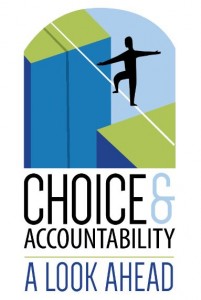
Editor’s note: This is the second post in our series on the future of parental choice and accountability.
by Mike McShane
As Kathleen Porter-Magee wrote in National Review earlier this year, for almost three decades conservatives have pursued a two-pronged strategy for education reform. One prong relies on standards and accountability, holding schools and teachers accountable for their results. The other relies on school choice, using the pressures of the marketplace to encourage improvement.
As school choice grows around the country, there are increasing calls for the prongs to twist into each other, with schools of choice (and the teachers within them) being held to the same or similar benchmarks as their counterparts in traditional public schools.
This manifested itself in numerous state Race to the Top applications. From New York to South Carolina, states promised that their new teacher evaluation systems would apply to public and charter schools alike.
It has also been a flash point in debates about school voucher programs. In Indiana, Louisiana, and Wisconsin, students participating in voucher programs have to take the same tests as their public school peers, and their schools are held accountable in ways similar to traditional public schools.
Many choice advocates and school leaders push back against this development. But such a stance begs the question: How can someone advocate for standardized test-based school and teacher accountability systems in traditional public schools while at the same time advocating for a parallel system free from any such oversight? It’s a fair question.
One answer: If we’re going to have a system that residentially assigns students to a school free from any competitive pressure, and we’re going to make attendance at that school legally compulsory, we have an obligation to regulate it (This is not a new argument, by the way; Jay Greene has made a variation on it for a while now).
At the same time, conservatives and their school choice allies can work to create a new and better system. This system, driven by parental choice and flexibility in funding, does not have to play by the same rules as the old system. In fact, it shouldn’t. Expecting a policy tool that was designed to do one thing—regulate a monopoly—to do another thing entirely—regulate a marketplace—is unreasonable. Rather, we should develop a new regulatory framework, and work to build capacity in the new system so more and more students can transfer into it.
So what does such a regulatory framework look like? I think it would be guided by a couple of big principles.
Carrots are better than sticks
There has been much sturm und drang around the smaller numbers of students with specials needs and English language learners served in schools of choice. As a result, numerous efforts are underfoot to require that charter schools and schools receiving vouchers serve some predetermined share of these students.
The problem? There is no nefarious explanation for why many schools of choice, particularly private schools in voucher programs, serve fewer students with special needs. Schools don’t get any extra money to serve them. In programs like Florida’s McKay Scholarships, where additional funds are apportioned to compensate for the increased cost, hundreds of schools respond to the need.
Rather than regulate on the back end what students schools are required to serve, let additional dollars for harder-to-educate students follow them into the schools of their choice. If money follows students in a way commensurate with the cost to educate and schools still choose not to serve them, then think about regulations.
Floors creep towards ceilings
When it comes to regulating a marketplace, one goal is to establish floors for quality that prevent harm for consumers. We regulate restaurants to make sure people don’t get food poisoning. We regulate automobiles so that they don’t fall apart at 70 miles an hour. Other than these minimal standards, regulators try to get out of the way and provide as wide a set of choices for consumers as possible.
In this same vein, it makes sense to ensure that schools are providing some educational program for students if public dollars are going to flow into them.
The problem is that too often floors creep upward and start to define more and more of what organizations do. Automotive regulations designed to ensure a basic level of crash protection have come to essentially mandate airbags and plastic bumpers. School accountability designed as a check against the lowest-performing schools has pushed more and more schools into maxing out time and energy on reading and math instruction.
Overzealous regulators, even those with the purest of intentions, can needlessly stifle diversity.
This should give advocates pause whenever they hear someone promoting “smart” regulations. This implies there are regulations insulated from the pressures of politics, economics, or overzealous do-goodery. There aren’t.
Performance Contracts
One concrete step (whether this is for individual course providers that participate in education savings account programs or course choice programs, or whole schools participating in voucher, tax credit, or charter school programs) is to use performance contracts to push providers to achieve desired results. (Andy Smarick offers one vision of what this might look like in his book “The Urban School System of the Future”.) Providers could negotiate with authorizers on the set of metrics that will be used to judge performance and a set amount of time to reach those goals. They would not have to be narrowly defined by standardized test scores. The process would be transparent and public record, and offer those who think the standards are too low and those who think the standards are too high the chance to hash it out.
But I’m just a guy looking at this from the outside. If I were to offer advice, the best course of action should be to get school leaders, choice advocates, and policymakers together for a frank conversation about what regulations help and what regulations hinder. If advocates and school leaders can come forward with a positive agenda, rather than continually having to beat back new encroachments, they would have the opportunity to shape the regulatory environment in a productive way.
Michael Q. McShane is a research fellow in education policy studies at the American Enterprise Institute.
Coming Wednesday: Robin Lake, director of the Center on Reinventing Public Education.




Mr. McShane:
I am a special education attorney who helps parents of special needs students access the myriad school choices in Florida. I essentially agree with your argument in concept but have three major problems with it. a) Maybe schools of choice which turn away disabled kids are not acting on “nefarious” motives, but having lived in many states and taught in multiple schools, I don’t believe schools are acting solely based on lack of financial means. In other words, schools (private, traditional and charter) turn away or fail to retain special needs kids because they often don’t know how to serve them and don’t want to bother to learn how to do so. The fact is that across states the trend is for local, state and federal special education funding to flow to LEA without separating the special ed funds from the gen ed funds. It’s often a matter of how well the LEA allocates the funds to serve special needs kids. When the charter is the LEA, then it’s the principal who determines that allocation. b) Your solution risks sounding a bit anarchistic, even idealistic in a society as large and diverse as ours. c) When you reference school choice advocates and school leaders coming together to discuss which regulations should stay or go, you’ve left a critical group out of the mix – parents. Parents, who are supposed to be the cornerstone of this school marketplace.